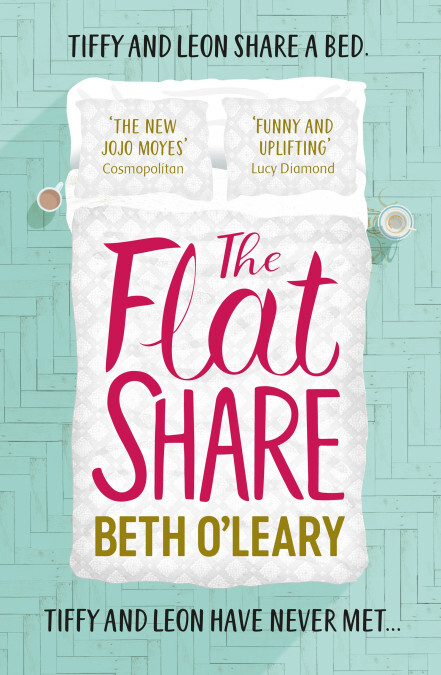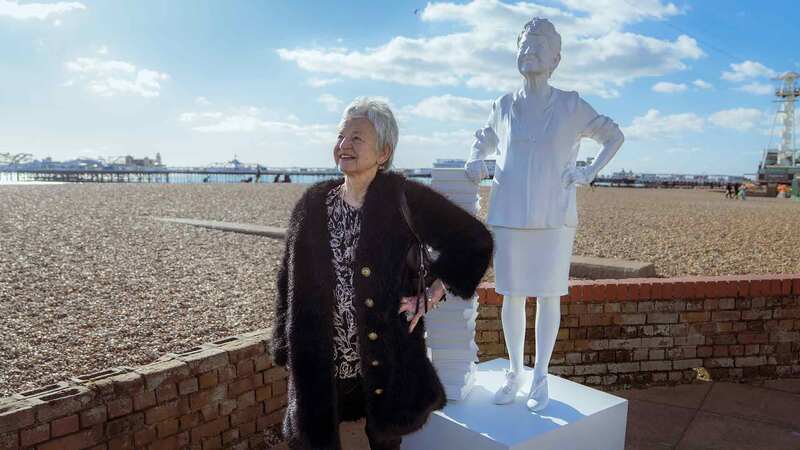You are viewing your 1 free article this month. Login to read more articles.
Beth O'Leary | 'I wrote almost all the book on the train...'
Former Penguin Random House Children’s staffer Beth O’Leary draws upon her own experience of renting in London in her début novel, written largely on her commute.
"We were naïve, just coming to London, and didn’t know how to find a good place," publisher turned author Beth O’Leary says of her renting days, which inspired her Quercus 2019 superlead The Flatshare. Like her protagonist Tiffy, driven almost mad by flat viewings in London, the author has also experienced mushrooms growing behind the toilet (the upbeat Tiffy suggests they add "a fresh, outdoorsy feel to the place").
 "I put that in for my old flatmate," O’Leary laughs from across the table during our interview at Hachette’s pristine office. "We got broken into, there was sewage leaking into my bedroom from the upstairs flat, loads of bugs came in... The other thing was, I was paying such a huge proportion of my paycheck because it was London and Zone 2. So many people were having that same experience of renting at that particular time."
"I put that in for my old flatmate," O’Leary laughs from across the table during our interview at Hachette’s pristine office. "We got broken into, there was sewage leaking into my bedroom from the upstairs flat, loads of bugs came in... The other thing was, I was paying such a huge proportion of my paycheck because it was London and Zone 2. So many people were having that same experience of renting at that particular time."
O’Leary’s début sent ripples of excitement across the publishing world ahead of Frankfurt Book Fair in 2017, when editor Emily Yau made it her first acquisition for Quercus after securing a two-book deal with a six-figure pre-empt. It has sold in more than 30 territories, and a significant US deal has enabled O’Leary to write full-time.
Billed as a "love story with a twist", the novel follows a pair of cash-strapped twentysomethings in London who share a tiny one-bed flat, communicating via Post-it notes and thoughtfully prepared treats, before finally meeting. Tiffy works for small, eccentric craft publisher Butterfingers Press, while Leon works night shifts as a nurse at a hospice. The novel is split into alternating chapters, featuring their wildly contrasting narrative voices. O’Leary, now 26, says she struggled with Leon’s perspective sometimes as he was so much shyer. "Tiffy was easier to write—she’s so outgoing and says what comes into her head. Leon picks his words much more carefully."
Ships that pass in the night
O’Leary explains she was inspired by moving from London to Hampshire with her boyfriend. "We had just moved in together in Winchester. He’s a junior doctor, and would do long stretches and odd hours. I was commuting, so I was getting up early and sometimes getting in so late that I would see him driving down the hill to work as I was coming home, and I’d think, ‘Oh, I almost saw him.’ I would use clues around the house to see how he was—like he’s gone for a run because his trainers are out—and we would leave food out, because it’s the little things you do to show you care when you’re not there."
O’Leary wrote the book on her one-hour commute to Penguin Random House Children’s, where she worked as an editor in the licensing team for three years. "I wrote almost all the book on the train... Having that one hour, and thinking: ‘I’ll see how much I can get done.’ I bought some noise-cancelling headphones, which are the best things I’ve ever bought. I spent four to six months writing it, and the same amount again trying to get it into shape and then sending it out to agents. For the first draft I wrote very, very fast, almost like I was trying to keep up with it—I felt like if I stopped writing, I’d be losing it."
Despite O’Leary’s intentions to write a "fun love story and a romantic comedy", she says that over the "one-hour splurges" the characters’ journeys spiralled into places she had not expected, influenced by her time working with prison libraries while at Penguin, her own past relationships, and research into emotional abuse. Beneath Tiffy’s breathless narration and Leon’s tightly-buttoned emotional life, there are dark themes at play, including "gaslighting" from Tiffy’s ex, battles with sexuality, and the looming shadow of the criminal justice system, glimpsed through Leon’s wrongly incarcerated brother. "I really set out to write a fun love story and a romantic comedy, and after I was a bit worried. I remember thinking: ‘Oops—I made it a bit serious, I don’t know how that happened’," O’ Leary explains. "I wanted to write real people in love, and everyone [character-wise] came with stuff that they are dealing with."
By the time she approached Tanera Simons at Darley Anderson in mid-2017, she was well versed in pitch letters, having written novels since her teenage years and also sent manuscripts out before. "I’d always written alongside what I was doing, but [writing full-time] never felt like a career I could do. If someone had asked me, ‘What do you want to do when you grow up?’, I wouldn’t have said ‘an author’, because it felt so unrealistic."
Simons helped her cut six chapters from the first 12, "which was really needed—it’s a much stronger book for it". Shortly afterwards, O’Leary got an email from her agent saying: "I’ve just shared this with my rights team and they’re quite excited about it... How quickly can you finish those last edits?"
When she got the offer from Quercus, Simons gave her strict instructions not to tell anyone for a day "so I had to go into work and not tell anyone, and I was just sat there at my computer, vibrating, and I was trying to do normal work and all I wanted to was tell them," she laughs. "But I was good."
There are many affectionate nods to the eccentricities of publishing, such as the "creative space" at Tiffy’s office which "doesn’t have a proper door (to convey a sense of openness) and there are whiteboards on the walls". Tiffy is used as a knitwear model by an eccentric author, and she frequently tries to distract colleagues waiting for her to pass edits: "You’ve had your hair done!" she tells one co-worker desperately awaiting the manuscript for "this bloody Pat-a-Cake baking book that I’ve been ignoring all day".
"It felt like such a dream to work for Penguin," says O’Leary, who clearly holds a lot of affection for her time in publishing, remaining in touch with many of her colleagues. It was the significant US deal with Flatiron which finally convinced her to write full-time. "I learned so much [at Penguin] that helped me with my writing and met some amazing people. I do miss it sometimes—the spark from working with lots and lots of creative people—because writing is such a solitary thing. But I feel it was the right thing for me to do." She adds: "It’s such a huge privilege to be able to do it, and it’s what I really love."
Extract
‘So, anyway,’ I say brightly, withdrawing my hands to wipe my eyes, ‘I need to move out. Now. Even if I wanted to stay and risk Justin bringing Patricia back again, I can’t afford the rent, and I owe him a ton of money, and I really don’t want to borrow from anyone, I’m kind of sick of not paying for things myself, to be honest, so... yes. It’s this or the flatshare.’
Mo and Gerty exchange a look. Gerty closes her eyes in pained resignation. ‘Well, you clearly cannot live here.’
She opens her eyes and holds out a hand. ‘Show me that advert again.’
I hand her my phone, flicking from Justin’s message to the Gumtree ad for the flatshare.
Double bedroom in sunny one-bed Stockwell flat, rent £350 per month including bills. Available immediately, for six months minimum. Flat (and room/bed) is to share with twenty-seven-year-old palliative care nurse who works nights and is away weekends. Only ever in the flat 9 a.m. to 6 p.m. Monday to Friday. All yours the rest of the time! Perfect for someone with 9 to 5 job.









